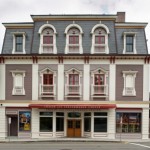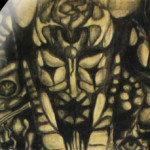Forums › Forums › iLive Forums › Archived iLive Discussions › How do you setup your surface
- This topic has 10 replies, 11 voices, and was last updated 12 years, 7 months ago by
parsen.
-
AuthorPosts
-
2012/05/14 at 6:02 pm #23150
 dshriverParticipant
dshriverParticipantThe advantage of a fully customizable fader bank is that it offers great flexibility to the setup. I’m curious how some of you routinely setup your strips.
Here’s what I do on my T112(usually):
Layer A 1-12 Input Groups and DCAs
Layer A 9-24 Input Vocals (or other “money” channels)
Layer A 25-32 Monitors and Main output DCALayer B 1-24 Inputs
Layer B 25-32 FX 1-4 and IP FX 1-4Layer C 1-12 More inputs
Layer C 9-24 Local board inputs (CD player, iPod, Talk Back, etc)
Layer C 25-32 FX 5-8 and IP FX 5-8Layer D 1-12 Outputs, Output Matrixes
Layer D 9-24 House Recording mics
Layer D 25-32 DCA mute groupsI spend most of my time in Layer A which gives me my input groups, vocals, monitors and main DCA. I switch the right hand bank to the FX on layer B and C as needed, and drop down to layer D when I need a mute.
Layer B is my input channels and where I control the balance in my groups
Layer C is even more inputs and the local inputs to the board
Layer D is my outputs, and is seldom used. It is also my audience and other recording mics.
-d
2012/05/15 at 5:10 am #30578Anonymous
InactiveOn most of my installs, because of the unfamiliarity of the console for the client, my set up is usualy this:
Layer A:
Inputs 1-20 , DCA 1-8
Layer B:
Inputs 21-40, Sends 1-8
Layer C:
Inputs 41-64 (some stereo), Matrixes and Mains
Layer
Fx returns, FX sendsThen, ill let them change it up to taste.
Gil Parente
Design & Integration
Entertainment Arts, Inc.
iLive 176, T112
iDR48 , iDR16, iDR10
Multiple iPads
Dante
Etc..2012/05/15 at 9:23 am #30579riggs1963
ParticipantI do the same as Gil but have FX on layer C and Masters on layer D and Ch 49-64 on layer D
Cheers
Dave
T112|iDR48+ACEcard|Laptop|iDR16|iPad|iPS10
2012/05/15 at 12:26 pm #30586Anonymous
InactiveI specialise in theatre, so my usual setup is as followsL:
Left hand bank: Inputs
Usually the top two layers for radio mics, the bottom two for band/orchestra (or a expansion/contraction of this arrangement depending on the requirement)
Middle bank, top layer: Any fader that is pertinent to the current scene, eg radio mics, DCAs, PC playback, etc.
Middle bank layer B: DCAs – Usually split into Drums, Backline, Reed section, Brass section, Strings, Keyboards. Then a DCA master for all music, and one for all vocals.
Middle bank layer C: FX sends
Middle bank layer FX returns
FX returnsRight hand bank, top layer: Main outs (LR, LCR or LCRSub) plus recording group splits
Right hand bank remaining layers: Aux outs
My workflow thus is left to right on the surface. From scene to scene, the only things I usually change are fader levels, mutes, panning, DCA assingments and Fader Strip assignments.
2012/05/22 at 4:27 pm #30653abstractnoise
ParticipantT80 user here, essentially a fixed install in a church:
Bank 1:
A: 4 x handheld vox mics, 4 x headworn speech mics, lectern speech, AV1 (stereo), AV2, CD(Stereo)
B: Kick, snare, OHs’ (stereo), Tom1, Tom2, Tom3, <GAP> Bass, EGtr1, EGtr2, AGtr1, AGtr2
C: Keys 1, Keys 2, Piano (stereo), Violin1, Violin2, Viola, Cello, DBass, Oboe, Clarinet, Sax, Flute,
 4 x handheld vox mics (duplicate) <GAP> 4 x Choir mics. – duplication here allows singers and choir to be easily balanced together.
4 x handheld vox mics (duplicate) <GAP> 4 x Choir mics. – duplication here allows singers and choir to be easily balanced together.Bank 2:
A: DCA’s for: Drums, Bass, Guitars, Keys, Strings, Wind, Vox (singers, inc choir), Band (all instruments)
B: Monitors 1-8
C: Loop, Overflow, Recording and 100V line aux mixes <GAP> Reverb FX, Delay FX
 <GAP> – available for customisation.
<GAP> – available for customisation.Not strictly layout, but might help explain logic:
Masters and matrices are hidden to help protect system EQ/delay/limiting, but accessible to those who know what they’re doing. Speech and playback wired straight to Master mix, no DCA. Band/Vox muting and levelling by “master DCA’s”.
Those of us with in-depth knowledge of sound/iLive will tend to customise for events much different to the normal Sunday services, otherwise the defaults as above give us a working mix within minutes of everyone showing up, and everyone knows where to find things.
First thing when arriving at a new rig is to hit the “defaults” softkey to recall a default scene, and plug in/unmute/customise/mix from there. Hit “defaults” when done, and the system is reset with all inputs muted ready for the next job.
Muuuch quicker than the old 32ch analogue with input/output patchbay it all replaced…
Work web: https://www.allsouls.org
Home web: https://abstractnoise.co.uk2012/05/22 at 5:50 pm #30654 mumuParticipant
mumuParticipanti have surface only scenes ready for unfamiliar users basic is:




layer d is my channel split for monitors
works pretty good
with anything else (groups/dca and such) i wait till it is requestedcheers
daveallways latest firm and software
iLive-144/t-80/idr-10 /idr-48/dante/pl-6/eyepad 1/belkin router/2012/05/23 at 6:18 pm #30662Robert
ParticipantMy setup on t112 is
left bank
A inputs
B inputs
c not used
d not usedmiddle bank
A inputs
B stereo inputs cd/pc ..
C
D corporate event stuff video inputs…Right Bank
A efx returns
B efx Masters
C AUX Masters
D group, L+R+Magutin.com
1x T80
2x iDR32
2 X M-MADI CARDS
2 X M DANTE CARDS
desktop+2x RME HDSP MADI
Macbook Pro,2x Macmini+DVS
T34-T80-T112-T144
evolution of SOVIET TANK2012/05/25 at 6:56 am #30678dnxmirrorsounds
ParticipantExcellent topic and particularly interesting is why people choose the layouts they have.
We are also a fixed install at a church with a T112. Different engineers have different layouts, some prefer to mix on DCAs and others in other ways.
My latest iteration, in which I have been reducing my dependency on an outboard Behringer BCF fader module attached to an editor (for extra Fader control) is as follows.
My concept is to be able to have everything available somewhere and to have in one layer (Layer D): all the things I immediately want to access as I mix. This isn’t totally possible e.g. FX + all the channels so I mix up my compromises to see what works for me this month

Furthermore, I aimed for a Right Master config so outputs are in the Right banks making it easier for sound checks and FX changes
So Layer D (My mix layer) has:
Left : Bass | Drums | guitars and Keyboard DCA
Centre : BGV DCA | Frontline Vocals | Wireless Mics
Right : immediate access vocal FX e.g DDL, main outs & FOH MatricesThe other layers which have the fuller lists are:
Layer A
Left :Bass, drums & MD mic for band IEM instructions
Centre :Gtrs, keys
Right :AUX – IEMLayer B
Left :Vocal channels (6xBGV, 6xFrontline)
Centre :other vocals e.g. Keyboards, wireless, headsets etc
Right :AUX – foldback speakers, production talkback feed, OB etc.Layer C
Left :DCAs (not mutes)
Centre :FX returns
Right :FX sendsSoft Keys have mutes:
1 – Drums mute DCA
2 – bass Mute
3 – Acoustic Gtr Mute
4 – Keys Mute
5 – BGV Mute
6 – Frontline vocal Mute
7 – vocal Group mute
8 – MIX select Main L (with a light so I can check I am going to change my FOH mix not someone’s foldback !)Duncan Whitcombe
@Dnxmirrorsounds
Mirror Sounds & metrochurch
Perth, Australia
T112, iDR48x2
http://www.mirrorsounds.com.au
http://www.metrochurch.org.au2012/05/29 at 6:33 pm #30697 kentlowtParticipant
kentlowtParticipantI am afraid my layout might not translate well.
T112
Left
Layer A Instruments are grouped by type with a DCA right next to each group Guitars,DCA,Keys,DCA,Horns
Layer B Drums & percussion
Layer C copies of a few of Bank A instruments with different processing and open channels
Layer D Playback channels and open channelsCenter
Layer A Horns DCA, Vocals with a DCA next to them followed by DCAs for drums/percussion(stuff buried)
Layer B Aux channels
Layer C effects
Layer D effectsRight
Layer A other voices a few DCA (for various purposes) a couple of effect controls for whatever is needed, mains(usually ganged so I only need one of them)
Layer B The rest of the Aux channels
Layer C any other DCAs and anything else not commonly used.
Layer D Matrix and a complete set of main controls.(feeds to delays etc)For me I like everything I am going to use a lot on the top(and not always in numerical order) the rest I prefer to bury them. Makes it easier for our volunteers in our setting. Since it is highly customized I doubt you could or should make a template based on it.
112T/IDR48/IDR16
2012/05/29 at 8:39 pm #30700theWhiplash
ParticipantMine for my band is set almost like if it was an analog desk.
A Layer 1 is Drum kit, Bass, sax
A Layer 2 is Keys, Gtrs, Vocals
A Layer 3 is iPod, Video/computer, extra RF/MC micsB Layer 1 is FX returns (6), and L/R/Sub
B Layer 2 is VCAs
B Layer 3 is FX Sendspretty straight forward–all Inputs on left and all outputs on right (for the most part)
Matthew Grunden
Big Daddy Weave
FOH/PM
iLive T80/IDR322012/06/04 at 10:24 pm #30752parsen
ParticipantThis is my typical set-up on the T112 which gives me lots of flexibility…
LEFT BANK
Layer A: input channels 1-12
Layer B: input channels 13-24
Layer C: input channels 25-36
Layer input channels 37-48
input channels 37-48CENTER BANK
Layer A: L,R,SUB,Matrix(front fill), Matrix(delay stacks), Matrix(spare), input CD, IEM master
Layer B: sends to 8 FXs
Layer C: returns from 8 FXs
Layer DCAs
DCAsRIGHT BANK
Layer A: IEM mixes on stereo auxes
Layer B: sends to 8 FXs
Layer C: returns from 8 FXs
Layer DCAs
DCAsYou will notice that layers B, C and D on the Center and Right Banks are the same. I find this very useful for facilitating workflow during a show.
best regards all,
Paul
-
AuthorPosts
- The forum ‘Archived iLive Discussions’ is closed to new topics and replies.